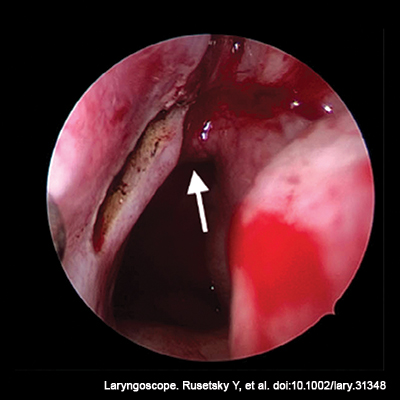Posterior septal artery flap for endoscopic repair of large nasal septal perforation aims to demonstrate the effectiveness of the endoscopic repair of large SPS utilizing flap pedicled with branches of PSA.


Posterior septal artery flap for endoscopic repair of large nasal septal perforation aims to demonstrate the effectiveness of the endoscopic repair of large SPS utilizing flap pedicled with branches of PSA.
Eustachian tube (ET) resection during EETA can lead to ET dysfunction and require myringotomy postoperatively.
Superior laryngeal nerve block is a safe and effective treatment of neurogenic cough, according to a recent study by the department of otolaryngology–head and neck surgery at the Medical University of South Carolina, Charleston, S.C.
Early adenotonsillectomy compared with watchful waiting and supportive care in children with mild sleep-disordered breathing (SDB) did not significantly improve executive function or attention at 12 months.
Disease-specific quality of life (QoL) is improved with septorhinoplasty (SRPL), functional endoscopic sinus surgery (FESS), and combined surgery, and combining the procedures does not compromise QoL gain.
Identifying and managing sensing lead malfunction in upper airway stimulation devices using the Inspire Medical Systems’ upper airway stimulation (UAS) device to treat patients with moderate to severe obstructive sleep apnea (OSA), to necessitate revision surgery.
Rates and clinical outcomes support the practice of definitive resection for occult invasive disease if feasible following a biopsy that demonstrates oral cavity cis.
Globus pharyngeus is the vague sensation of having something stuck in the throat, with no single known etiology. Research shows low incidences of head and neck cancer with isolated complaint.
Mitochondrial gene maps of patients with allergic rhinitis (AR) indicated that the ATP6 gene is probably associated with AR at the single-variant level.
Avoiding radiation therapy for human papillomavirus virus−associated oropharyngeal squamous cell carcinoma (HPV-OPSCC) can help quality of life for younger patients.